
More no more
The consumerism of the residents of rich countries and the pollution we generate are a real threat to the environment. If we want to change something, we have to face this time and say to over-consumption More no more.
It has been calculated that if all the people of the Earth were to consume as much as the inhabitants of developed countries, we would need 3-5 planets to maintain our lifestyle. The consumerism of the residents of rich countries and the pollution we generate are a real threat to the environment. We currently use 32 times more of all global resources than the majority of the populations in the developing world. Our own populations are still growing. In light of this, a critical look at the way we consume goods is long overdue.
The exhibition shows the importance of understanding the objects we surround ourselves with. Where do they come from? Where and under what conditions are they brought about? How much material was used to create them? Confronting the impact of our material culture allows for a new conversation and the possibility of a new model for society, a healthier one, based on respect for the environment and an optimal rate of resource exploitation.
The works presented at the exhibition depict a rational approach to consumption. They ask the question – who is responsible for excess? By examining the life cycle of an object, manufacturing companies can significantly alleviate this burden on the planet. Accordingly, the choices of consumers, even those with the best of intentions, show how crucial consumer education is in dispelling falsehoods and myths such as greenwashing. If we want to change something, we have to face this time and say to over-consumption: More no more.
Fashion industry
The modern model of fashion production is exhausting for the environment. To make a cotton t-shirt, you need 2 700 liters of water. This is the amount an average person drinks within 30 months. There is a need for profound changes in the industry, which must begin to treat the planet and society more sustainably.
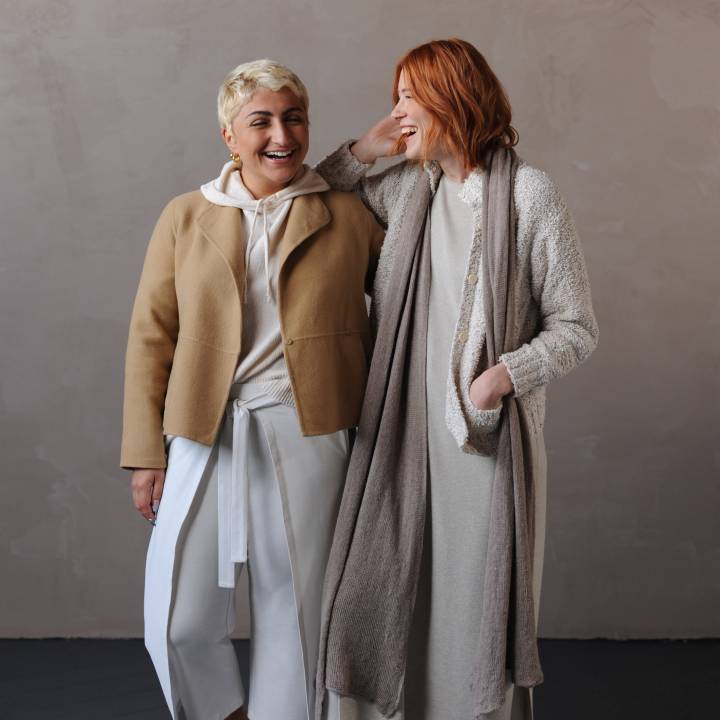




Renew + Waste No More
clothes and textile collection
How to create a responsible brand?
While developing her fashion brand, Eileen Fisher has also created a return program for the circular economy. Since 2009, Tiny Factory, the sorting plant she founded in Irvington, has received as many as 1.4 million items of clothing. Clothes are meticulously sorted according to consumption and then divided between several intermediate designs. Those in perfect condition go back to the store as part of the Renew collection. The clothing with slight damage is repaired and reworked through the Resewn collection. Since 2018, in cooperation with the artist Sigi Ahl, Fisher debuted with the studio Waste No More, dedicated to creating unique artistic fabrics from the most damaged and abandoned clothes. The designer's multi-pronged activities are more than just recycling – they are a literal and long-term establishment of responsibility for every scrap of material they produce.




Ushrika Cooperative
initiative
How can collective cooperation improve the economic and social status of minorities?
In a time when fashion companies aren't held accountable, Ushirika could be a model example of prudence towards the environment and society. The brainchild of Alicja Wysocka, it is more than just clothes. Kenyan slum residents, in collaboration with artists, create clothing, accessories and other projects through collective and tribal work. The exchange of experiences and skills, mutual creativity, conversations, trips and eating out has formed a cooperative that has transformed the lives of the women employed in it. Profit from the sale of products is allocated to the salaries of members of the cooperative, its functioning and renumeration for teachers. The creators are covered by health insurance, they are provided with food, run a radio station and can come to work with children. Materials used for production are produced locally or are recycled. The cooperative creates goods both for the local market and for export – a stationary store operates in Krakow.





Mending Cracks
art project
How can we pay attention to the consequences of capitalism?
Mending cracks is primarily a tribute to repairing items. An upcycling artistic project using sweaters from the school uniforms of children from the Mathare – Nairobi slums. Students were provided with new clothes, while their second-hand uniforms served as material for the project of Markiewicz project, which is a critical commentary on the fashion industry. The artist, using red cashmere thread, repaired them with Japanese boro embroidery. Contrast stitching and patches resemble open wounds and scars – this is a metaphor for the destructive impact of capitalism on Kenya and our entire planet. The project was implemented as part of the Cooperative Spółdzielnia Ushirika, through which women working there exchange experiences with artists




Clear Fashion
app
How to buy responsibly?
Clear Fashion is a French mobile application for improving awareness in the field of responsible fashion. To use it, just scan the label of the clothes you are interested in with your phone. In return, you will receive an analysis of the brand's practices. The verification is carried out in terms of 32 criteria divided into 4 categories – health, environmental impact, animal welfare and social impact. Information is obtained directly from the manufacturer. If he wants transparency, he provides it voluntarily. Sometimes, however, data is disclosed only after pressure from consumers. As a result, we gain access to cataloged information about the production cycle – from sourcing materials to transport. Currently, the database contains about 100 brands, from large chain stores to niche manufacturers, but is constantly growing thanks to the activity of the user community.
Excess Of Clothing
The idea of disposability is the foundation of fast fashion. On a planetary scale, we use around 150 billion pieces of clothing annually. This is four times more than 20 years ago. The motto of modern clothing stores – buy cheap, quickly throw away – causes that the amount of clothes landing on the wastefill is increasing at an alarming rate.





Carlings Digital Collection
digital clothes collection
How to prevent one-off clothes purchases in an unusual way?
Influencers on social media constantly need to create new and interesting content to keep their fans engaged. Many of them are under pressure to appear in every post with a fresh look. This behavior favors one-off purchases and fast fashion. Companies are racing to send them free stuff in the hopes that these celebrities will wear/use their clothes or other products for some good advertising. In response to this problem, Carlings created the world's first virtual collection of clothes. Neo-Ex are clothes for the digital age. Just buy the designed model you want, send your own photo, and 3D designers will match it perfectly to your figure. Just post the result and sit back and wait for likes.





De Rrusje Suit
uniform
How to create your identity by means other than countless clothes?
After many years of work in the fashion industry, Bonne Reijn began to feel that its constant push for new collections was unrealistic. In opposition to this phenomenon, the designer decided to create his business around one product. As he says, he wanted to convince people that there was nothing wrong with wearing the same outfit all week. In early 2014 Bonne designed a batch of black and white two-piece suits, and labeled them BONNE. Today these suits are for sale in varying colors and fabrics. The name De Rrusje Suit, or "poor man's suit", refers to how minimalism breeds creativity. A person's identity can only be defined by them, not their clothing. Due to a designed neutrality, the garment does not specify social, gender or material status roles. It is a kind of social blankslate.





Salaula
installation
What is the impact of European clothing chains on Zambia's economy?
Salaula in the language of the Zambian people means selection by searching the stack. It's also the name given to the bustling second-hand markets in this country. The side effects of fast fashion from developed countries have put pressure on local textile and fashion companies that are not able to compete with the recycling industry and low-quality clothing imported from China. Lotte de Haan decided to trace the path that our abandoned clothes follow. Seen as a pro-humanitarian action, donations from European textiles actually create a lucrative business worth $ 5 billion a year. Working with many sellers on the Lusaka market, from wholesalers to tailors, she created a series of sun umbrellas from old clothes. Each presents the geographical territory and the impact of rejected textiles on Zambia. Together they represent the new global map of the used clothing market.
Watch the series of 5 videos :
- Salaula – selection by searching the stack
- The Vendors – suppliers
- The Industry – impact on the local clothing industry
- International Influence – China's expansion to Zambia's economy
- The Dumps – 80% of European textile waste ends up in Lusaka.
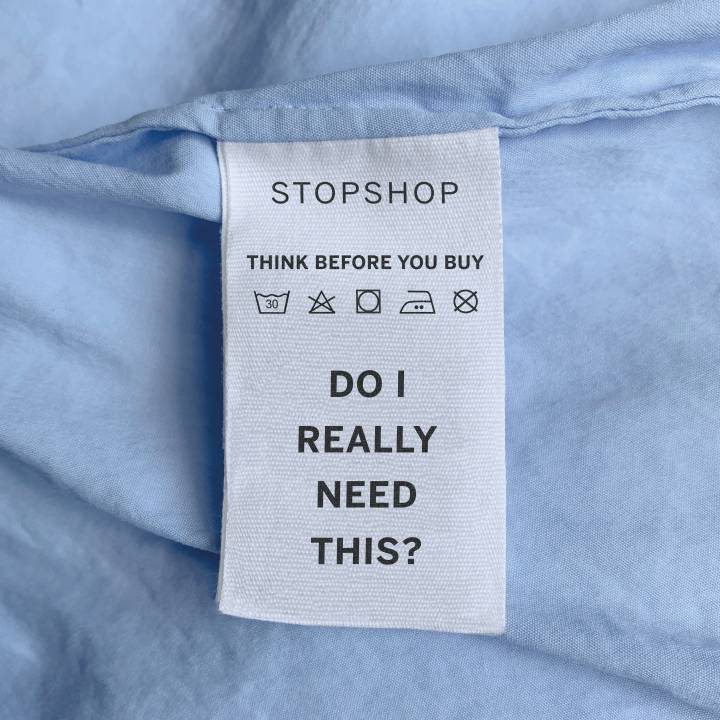




Project Stopshop
campaign
How to say "no" to fast fashion?
While working on her diploma in fashion promotion studies, Elisabeth Illing decided that instead of becoming part of the problem of fast fashion, she would like to create a campaign reflecting its negative effects. Every year, popular chain stores announce dozens of micro-trends around which they create versions of exclusive brand products. Ultimately, these clothes bought at a fraction of the price will fill up landfills, compete with local markets in Africa, or be burned. In response, the artist created a series of installations and photographs with texts that, although they resemble marketing slogans, are in fact a criticism of the activities of fast fashion stores. For greater impact, these appear in the form of tags, receipts and store stands. Thanks to this, the campaign is even more eloquent – it gives voice to clothes to tell the truth about themselves, their origin and the future of our wardrobes.





A waste of energy?
installation
Is the burning of clothing the best possible solution?
The first H&M store was founded 70 years ago in Västerås – today there is a power plant where unsold clothes are burned. Burning products from previous collections is a common solution in the world of fast fashion. New, unworn clothes are classified as garbage in one industry and as desirable fuel in another. The power generated during combustion is deemed clean energy. But is this really the best approach to use resources, or is it simply the acceptance of waste resulting from our consumer culture? A waste of energy? is an installation presenting the life cycle of clothing, from raw material, through product, to energy. It illustrates the effort put into closing the circle of its use. It reveals the absurdity of this modern phenomenon in which products that consume huge amounts of energy during production are destroyed under the banner of sustainable development.
Excess of Items
During our lifetime we will spend a total of 3 680 hours or 153 days searching for lost objects. Research shows that we lose up to nine elements every day – or 198 743 throughout our entire life. At the top of the list are phones, keys, sunglasses, and documents. You can't hide that we are overwhelmed with things that we don't often need. Missing items are the lightest consequence of the ownership-oriented lifestyle. Destroyed ecosystems, abused employees, conflicts for natural resources are the consequences we should think of every time we buy something new and unnecessary. It's just one thing – millions of people have thought.
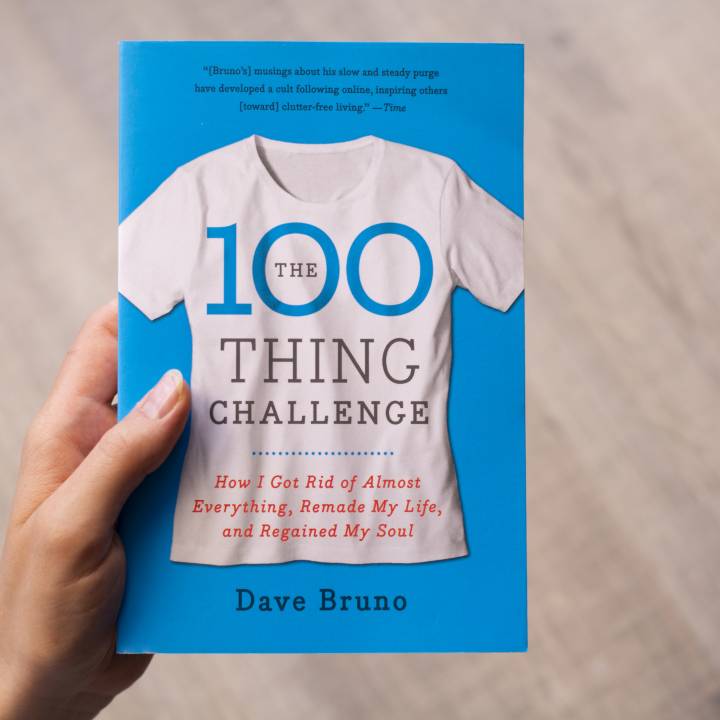
“The 100 Thing Challenge”
book
How many things do we really need?
Statistically, Americans spend $ 1.2 billion a year on items they don't need. When in 2008 Dave Bruno decided to limit his possessions to 100 items, he did not realize how much impact he would have on the contemporary understanding of minimalism. His experiment became the ground for a grassroots movement of people who, like him, want to surround themselves only with what is necessary. Although in his book the author gives a lot of practical advice and describes the anecdotes associated with this adventure, The 100 Thing Challenge is in fact a much deeper reflection on the culture of consumerism, which fuels the urge for continuous possession of more.




One Car Less
initiative
Can you live without a car?
The name speaks for itself. On the blog One Car Less, the author Krzysztof Gubański encourages readers to join and helps them find a place in the community of cargo bikes lovers. Although he has a driving license, he has been using the bicycle as a basic means of transport for over 13 years and proves that you can ride it to a wedding, do some big shopping or transport a fridge (or even two!). On his page and Facebook we can find answers to pragmatic questions such as: where to service a cargo bike or how to choose a two-wheeler correctly, but also material for real enthusiasts – a gallery of the most beautiful ads with bicycles in the background and coverage of rallies.
Excess of food
42% of Poles admit that they do throw away food, and 35 % of them do it several times a month. At the same time, as many as 120,000 Polish children come to school hungry. These figures are the two opposite poles of the problem of food waste. Although hunger is not associated with developed countries, unfortunately throwing away edible food is slowly becoming their trademark. These unfortunate data show that the disproportions in sharing goods are not as foreign to our culture as we think.



Too Good To Go
app
How to reduce food waste?
One-third of the food produced ends up in the bin. An average Pole wastes 247 kg annually, which puts us in fifth place in the EU, where the average is 173 kg. The developers of Too Good To Go have endeavored to confront this problem. It is a tool that allows businesses and users to counteract food waste every day. It connects shop and restaurant owners with consumers who can buy cheaper sets of unsold but edible products. Thanks to this, restaurateurs do not incur losses, and customers can enjoy a wholesome meal at a fraction of the price. The surprise package contains perishable products, such as bread, but you never know exactly what you'll get. The project is active in Poland and in the world, bringing together approx. 39 thousand partner premises. The company is also involved in projects that help build awareness and seek solutions in the area of food overproduction.
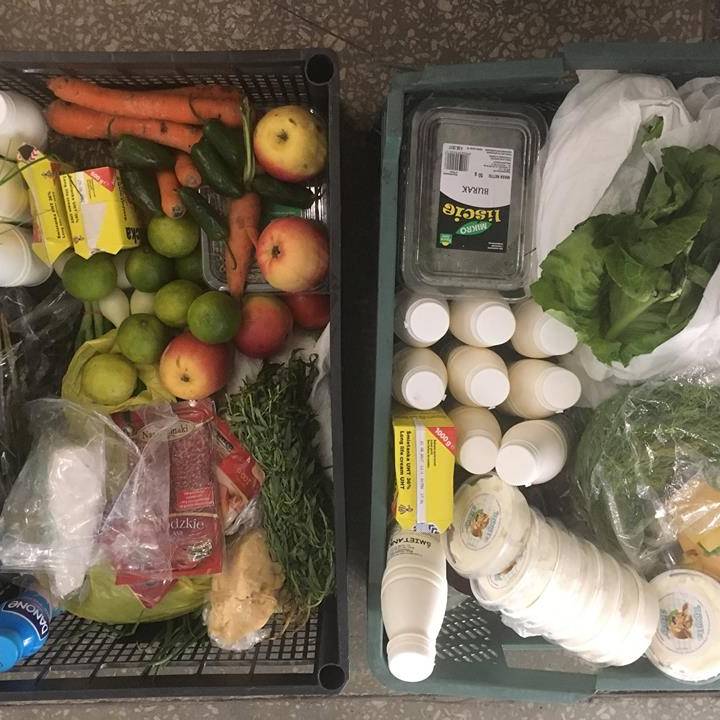



Jadłodzielnia Foodsharing
initiative
What to do with food that is not useful to us anymore?
Foodsharing is an initiative whose mission is to prevent food waste and to expand the Jadłodzielnia network – places with a cabinet or fridge for foods that we want to pass on. Anyone can leave food that cannot be consumed and which others will enjoy. To increase the percentage of rescued food, unsold groceries are also collected from stores and food outlets as part of the project. Then they are transferred to the aforementioned points or other outlets in need. Activists also create educational events – by preparing refreshments from saved food they show that attractive and nutritious meals can be created from products considered to be a waste. They focus attention on the problem and encourage people to respect food and minimize its waste.
Sustainable production and reduction of consumption
It is time for developed countries to take responsibility for exploiting developing countries. Shrinking material resources increase political tensions between communities, and items produced in inhuman conditions return to the place of their production in the form of garbage from Westerners. Today, in the face of the environmental crisis and growing inequalities, strengthening ethical and environmentally sustainable production is key to tackling global problems.
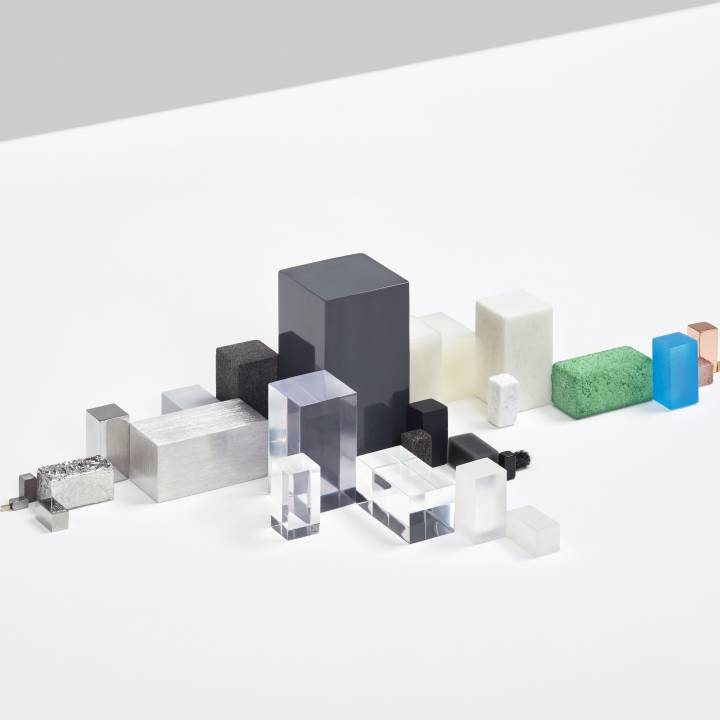




Materialism
installation
What do we know about the materials that make up our items?
Demand for raw materials is still a central element in numerous geopolitical tensions. Although we prefer to think of this as a political problem, it is unfortunately linked to the choices we make. Everything that is bought and consumed has an impact, strengthening complex systems of resource extraction, labor, production and distribution. Materialism is an installation made up of samples of materials that confronts the viewer at a very elemental level with the objects and materials that surround us. Everyday products such as a vacuum cleaner, Volkswagen Beetle, pencil or PET bottles have been reduced to the exact amount of specific raw materials from which they are made. Shown in the form of cubic blocks of material, they are a record of human history in terms of availability, tradition and the state of our technical knowledge over hundreds of years. This trivially simple but eloquent form evokes reflection on the value of raw materials lost with each thoughtlessly discarded object.
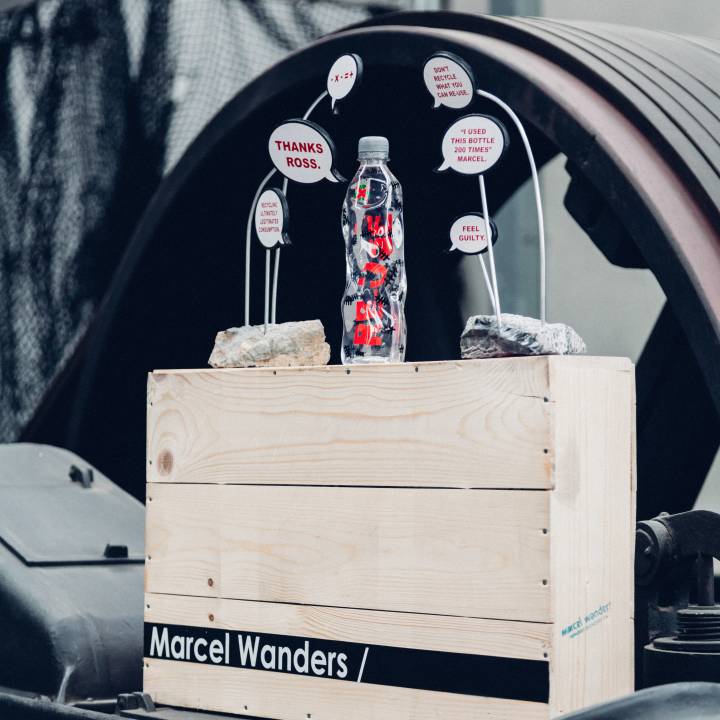

Don't Recycle What You Can Reuse
installation
Is recycling the only way?
A gesture of criticism towards the idea of thoughtless recycling. When Marcel Wanders was asked to participate in a collective exhibition promoting recycled plastic projects, he presented a water bottle. For three months he used it many times to finally present at the exhibition of the prestigious festival. It might seem like a mistake or eccentricity, but behind this inconspicuous object was a subversive manifesto. The author wanted to object to the promotion of the reuse of plastics, so as not to justify excessive consumption of such an environmentally harmful material. He notes that recycling removes the guilt involved in overproducing it and gives a false sense of ecological behaviour. Many of the objects that wind up in sorting centres could be used further or replaced with materials made of durable raw materials.
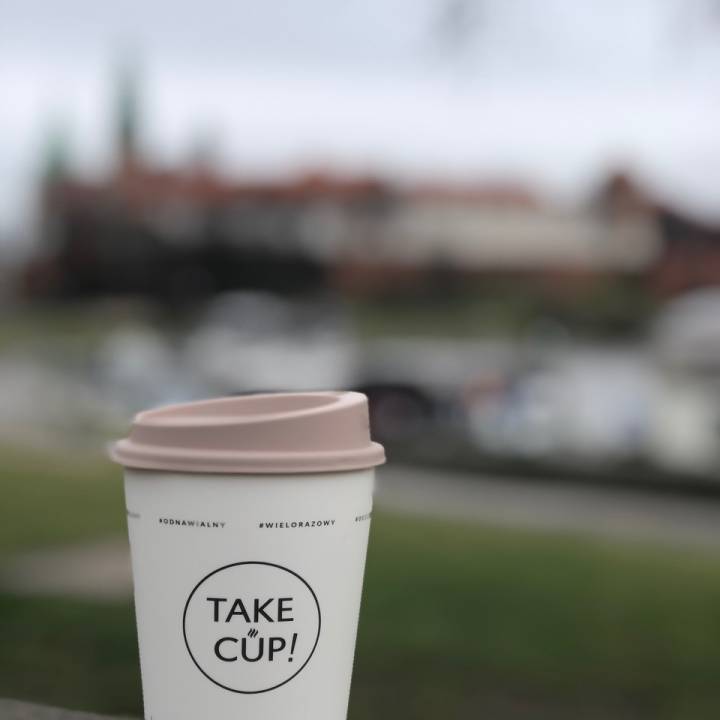

Take!Cup
circulation system
Is paper packaging ecological?
There is a false belief that drinking from paper cups is ecological. Unfortunately, the raw materials used for production, as well as the plastic film or wax covering the interior, are a burden to the planet. Creator of the Take!Cup initiative, Adrian Golonka counted that if every hour over 320 thousand disposable cups are used, it results in a total of almost 2.4 billion wasted per year. This take-out, closed-loop system gives consumers the chance to reduce this number. Currently available at 11 Krakow restaurants, the startup provides reusable polypropylene cups that customers take after pledging a 5 PLN deposit. The founders invite not only gastronomic establishments to the project, but also local governments, institutions and organizations throughout Poland. They try not only to expand the network of system partners, but also to support them in the process of changing habits. They plan a series of educational activities accompanying the initiative.




TMA-2 HD
headphones
Does technological development of the equipment have to involve its complete replacement with a new one?
Cheap, consisting of many, mostly permanently-integrated raw materials, not suitable for recycling or repair – headphones represent the indifference of the technology industry towards the environment. By creating their product, AIAIAI tried to make the product life cycle evolve in proportion to the needs and development of the user, without having to completely replace the equipment. They have a modular structure, and the user has access to components from approx. 1000 combinations from the loudspeaker, through the length of the cable, to the material. Thanks to this, it is possible to adapt them to various circumstances, professions or usage, or replace them after damage to a component. By modifying the equipment, we receive data showing the impact of these elements on the quality of the sound received. TMA-2 is a fully professional, technologically advanced product trusted by artists from around the world.
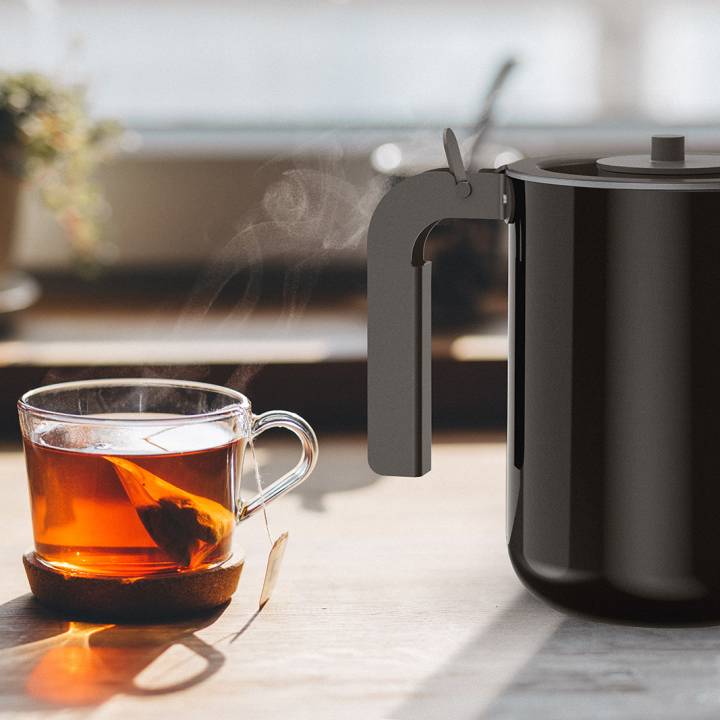



Induction kettle
Is service-oriented design a necessary future?
It is estimated that without programmed product aging, the average citizen could save 50-60,000 Euro in a lifetime. In addition, it would mean significant savings for society and the environment by eliminating the need to process outdated products. The design of an induction kettle was a pretext for the author to consider sustainability. The device is serviceable, due to its logical construction, the use of standard screws and a lack of so-called service traps. In addition, the components can be recycled. The project adheres to the value of repairing and is an expression of opposition to the planned aging of objects. Simple and reliable solutions reflect the fact that we do not want to part with some things and we are willing to use them throughout our lives.
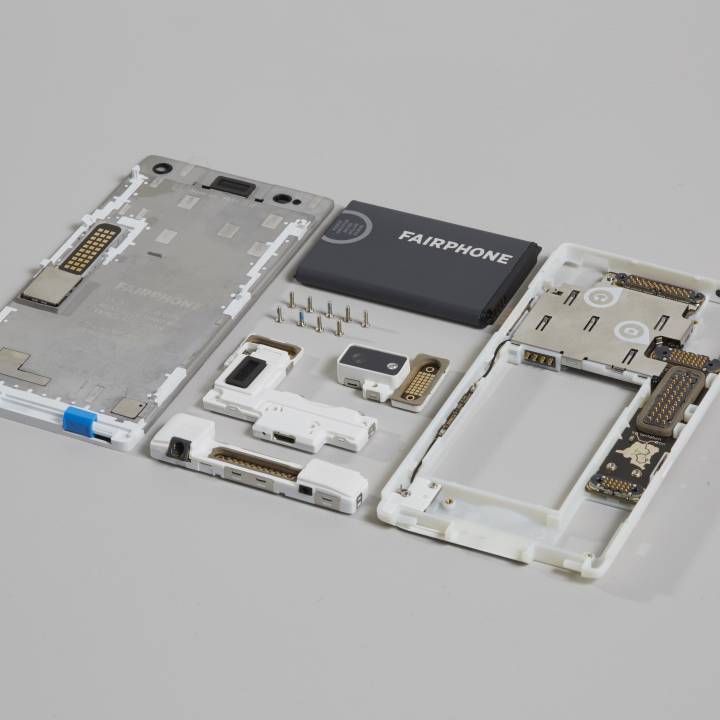




Fairphone
smartphone
What if our devices were both easy to repair and produced as ethically as possible?
Planned consumption and exploitation of employees are only part of the sins of the electronics industry. From responsible sourcing of materials, through transparency of activities, to supporting employees – Fairphone strives to set new standards of conduct for the industry. Originally, the company dealt with a campaign on conflict minerals, now it focuses on creating smartphones. Thanks to the intuitive design, access to the interior of the phone and replacing broken parts with replacements are uncomplicated and available to every user. No complicated equipment is needed for replacement, most things can be opened without tools or with a classic screwdriver. The strategy encourages repair of the item instead of buying new devices.



BIO vegetables high-resolution laser labels
labels
Who should be responsible for food packaging?
Recently, fruit and vegetables with labeled markings can be found on the shelves of Lidl supermarkets. The BIO symbol is applied to the surface of the product with a high-resolution laser. This allows you to remove only the pigment on its outer skin, while the interior is not affected in any way. It has been calculated that about 50 million plastic labels produced from pieces of foil with a total weight of 50 tonnes can be avoided in this way. Lidl is not the only producer using this solution, more and more large retail chains such as Carrefour, Jumbo, Edeka and Marks & Spencer have adopted this method. This phenomenon gives hope for a positive trend among food corporations – taking responsibility for the waste they produce.
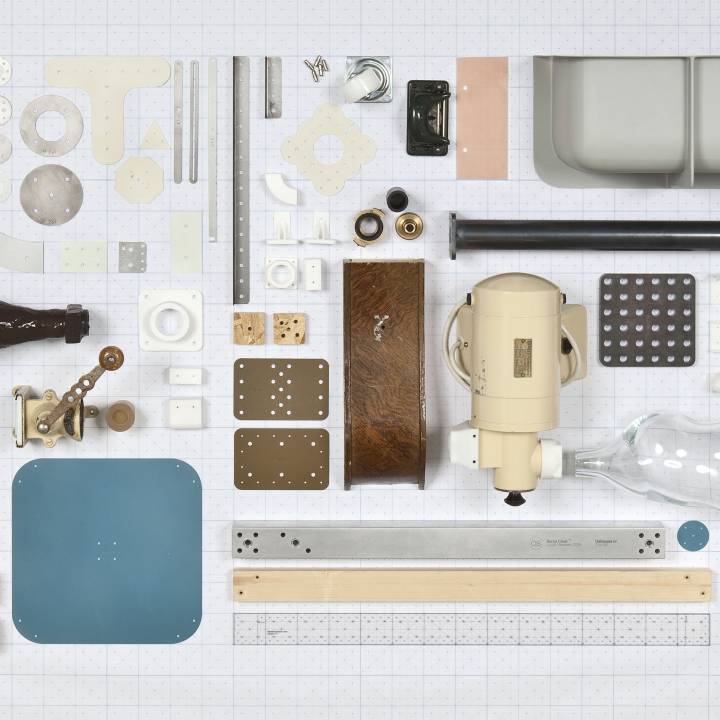




OpenStructures
system
Can we design fully modular objects?
OpenStructures is a modular, grid-based system for creating and modifying objects. The constructions are made available on the Internet together with instructions for their assembly. It is an intrinsically expanding network in which everyone can participate. The project opposes purchasing as a traditional way of acquiring goods and encourages people to self-produce. It attempts to fill the gap in the frustrating and shoddy corporate customer repairs system. Modifications can be made by hand, and hard-to-find elements can be replaced with a creative substitute. OpenStructures encourages producers and designers to create commercial projects based on the system standard, which in the future will facilitate their repair or be transformed into new products at the end of life.
Greenwashing
Greenwashing, or green lie are marketing activities designed to convince consumers of the supposedly caring intentions of companies and brands. More than half of buyers (57%) declare that they would be willing to pay more for products which are safe for the planet. Many manufacturers use this fact and declares their commitment for sustainable production. In fact, it is just taking care of their profit and image. These ethically questionable actions cause the public confidence in ecological initiatives to weaken.





Woke Wash Agency
animation
Can we trust the intentions of large brands?
A critical look at marketing using important, social topics as a sales tool. The short animated film questions the use of social injustice as a marketing strategy. Nowadays, it seems that all major brands support women, the LGBT + community, are concerned about the fate of the planet and promote racial diversity. They try to convince us that they share similar values and want to create a better world. But are we sure? Woke Wash Agency is a fictitious advertising agency that will create a better image and wash the dirt off your company. By presenting the laundry facilities, Sjo Schütt builds consumer awareness, reveals the true intentions of companies, and introduces us to the term woke washing. Activities such as playing on the feelings of customers, intentional controversy and fabricated authenticity are revealed and evaluated by the audience.
